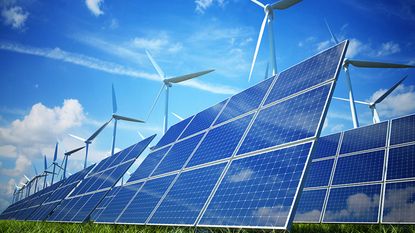Jeremy Grantham: US should focus on “green” infrastructure spending
Jeremy Grantham, co-founder of asset manager GMO, says the US must set out on a new “green” Marshall Plan to tackle climate change.

If the US is serious about tackling the biggest challenges facing the country right now, it needs to embark on a new “green” Marshall Plan, says Jeremy Grantham.
Jeremy Grantham, who co-founded US asset manager GMO in 1977, believes the US government should take advantage of historically low interest rates to finance “a long, sustained and massive public works programme”, similar to the scheme that helped to rebuild Europe in the wake of World War II, “at negative real rates”.
While Covid-19 is today’s obvious concern, Grantham is more worried about long-term issues. “I believe income inequality is eating away at the economy from the inside with the lack of economic progress for workers reducing demand.”
Subscribe to MoneyWeek
Subscribe to MoneyWeek today and get your first six magazine issues absolutely FREE

Sign up to Money Morning
Don't miss the latest investment and personal finances news, market analysis, plus money-saving tips with our free twice-daily newsletter
Don't miss the latest investment and personal finances news, market analysis, plus money-saving tips with our free twice-daily newsletter
This problem goes back to the financial crisis, if not beyond. “The great waste in 2009 and 2010... was the use of precious resources to bail out banks,” says Grantham. The decision “was both unjust and economically inefficient: it was a violation of the spirit of capitalism”.
A new Marshall Plan should focus on “green” infrastructure spending: “It is absolutely imperative that the entire economy be greened if we want any hope to maintain a stable global civilisation in coming centuries.” Infrastructure in the US is already “unusually behind schedule on maintenance and subpar quality”, and many of the jobs created would be “industrial and labour-intensive”, helping to address growing inequality. The move would also help challenge China’s “growing dominance” in green tech.
-
 Barclays warns of significant rise in social media investment scams
Barclays warns of significant rise in social media investment scamsInvestment scam victims are losing an average £14k, with 61% of those falling for one over social media. Here's how to spot one and keep your money safe
By Oojal Dhanjal Published
-
 Over a thousand savings accounts now offer inflation-busting rates – how long will they stick around?
Over a thousand savings accounts now offer inflation-busting rates – how long will they stick around?The rate of UK inflation slowed again in March, boosting the opportunity for savers to earn real returns on cash in the bank. But you will need to act fast to secure the best deals.
By Katie Williams Published
-
 The industry at the heart of global technology
The industry at the heart of global technologyThe semiconductor industry powers key trends such as artificial intelligence, says Rupert Hargreaves
By Rupert Hargreaves Published
-
 Three emerging Asian markets to invest in
Three emerging Asian markets to invest inProfessional investor Chetan Sehgal of Templeton Emerging Markets Investment Trust tells us where he’d put his money
By Chetan Sehgal Published
-
 What to consider before investing in small-cap indexes
What to consider before investing in small-cap indexesSmall-cap index trackers show why your choice of benchmark can make a large difference to long-term returns
By Cris Sholto Heaton Published
-
 Why space investments are the way to go for investors
Why space investments are the way to go for investorsSpace investments will change our world beyond recognition, UK investors should take note
By Merryn Somerset Webb Published
-
 Time to tap into Africa’s mobile money boom
Time to tap into Africa’s mobile money boomFavourable demographics have put Africa on the path to growth when it comes to mobile money and digital banking
By Rupert Hargreaves Published
-
 M&S is back in fashion: but how long can this success last?
M&S is back in fashion: but how long can this success last?M&S has exceeded expectations in the past few years, but can it keep up the momentum?
By Rupert Hargreaves Published
-
 The end of China’s boom
The end of China’s boomLike the US, China too got fat on fake money. Now, China's doom is not far away.
By Bill Bonner Published
-
 Magic mushrooms — an investment boom or doom?
Magic mushrooms — an investment boom or doom?Investing in these promising medical developments might see you embark on the trip of a lifetime.
By Bruce Packard Published